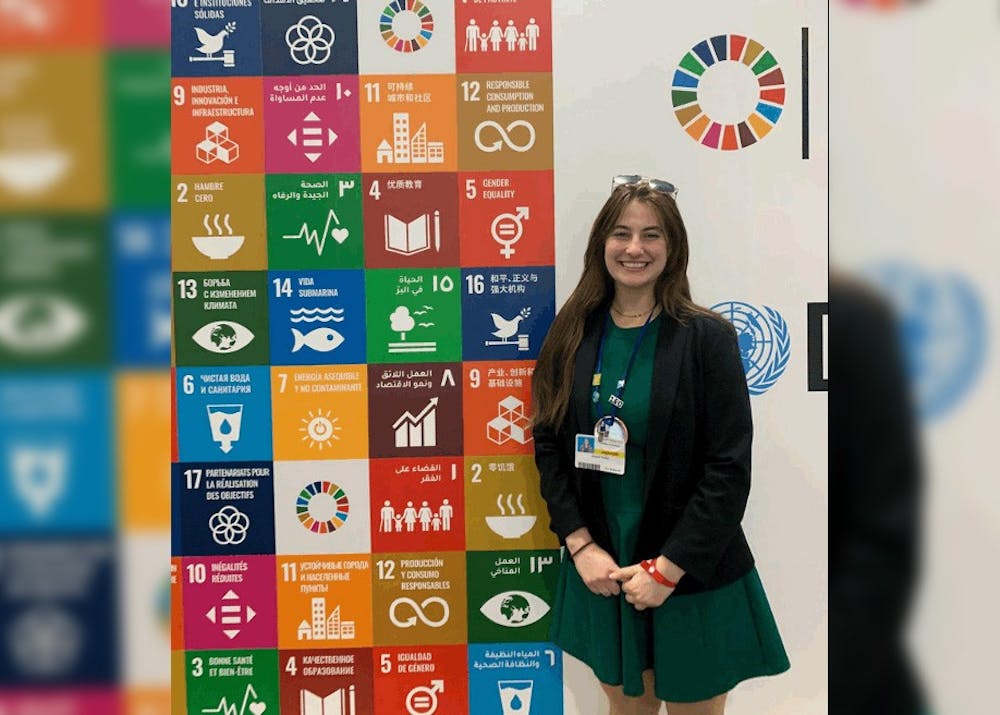Interested in writing a letter to the editor or guest column for the Indiana Daily Student? Check out our guidelines and submission details here.
While everyone was shivering on the walk between classes and stressing about finals the week before Thanksgiving, I was in sunny, seaside Egypt relaxing by the pool. Well, not really. In reality, my fellow delegates and I were actually running between temporary tin buildings, scrounging for water and sneaking in hotel food to the 27th Conference of the Parties, where we stayed inside the gated walls of the conference from 8 a.m. to 7 p.m. every day.
While exhausting mentally and physically, I feel incredibly fortunate and lucky to have been part of the IU student delegation that traveled to Sharm El Sheikh, Egypt, for COP27. The experience was unforgettable, and the time and research it took to get there was as intense as the conference itself.
As an international studies major, I study climate change, but I do it through a less scientific angle than my classmates. I also major in Arabic and am a member of the Arabic Flagship program, and I minor in global media. Capitalizing on these interests, I studied climate change communication in Middle Eastern media outlets at COP27, or at least I tried.
We were told to be flexible, and that pivoting our research at COP27 would be a likely reality. I was prepared to be flexible with the countless sessions I attended and interviews I conducted, but I was not prepared for the imposter syndrome that consumed me on those first two days.
Being a part of the United Nations in any capacity has been my dream since I was 12 years old sitting in a musty, all-girls private school in Canberra, Australia, surrounded by children of diplomats and foreign dignitaries. COP27 made my dream a reality — but it was not all smooth sailing.
The delegates were stressed, tired and equally as hungry as the thousands of observers from non-governmental organizations and universities eagerly waiting to catch the delegates running between meeting rooms. I felt like I did not belong. Most students were either in graduate or Ph.D. programs or were researching highly specific topics, but I wasn't.
My job was seemingly easy. I had to stalk the media and ask them questions – nothing too difficult or with complex terms and scientific language, although class had prepared me for that. However, my seemingly straightforward job turned into an immense challenge.
The media center had been accessible to all attendees in the past, but it was off-limits to observers. The camera crews waiting outside plenary rooms for high-level officials were technical assistants contracted from Cairo and were unable to comment on the media company they were representing. Eventually, I rallied and overcame these barriers with the help of my five years of Arabic language at IU and the help of a few new Egyptian university friends.
The nature of my research is rather delicate because free speech is not necessarily a right for all in the Middle East. Tears were shed, connections were made, and I intend to keep my promise to keep the core of my research off the internet and between us. My COP27 was not only an overwhelmingly beautiful rollercoaster, but it was also an emotional moment of connecting with members of global humanity.
There are some highlights from COP27 outside of my research entirely. The venue was massive, with hundreds of pavilions from countries, businesses, organizations and even a space for children and youth to raise their voices and call for climate action. I exchanged countless WhatsApp messages with delegates, activists and students from around the world.
COP27 is the most global event I have ever attended, and it was the greatest display of collective action I have ever been involved in. From Indigenous activists sharing their climate stories to Austrian delegates sharing negotiation tea on the bus to the hotel, COP27 was truly all I hoped it would be.
The irony of flying halfway across the world to watch world leaders and politicians debate about the indisputable impending doom of climate change is not lost on me. However, progress was made. The Sharm El Sheikh Implementation Plan is the key outcome of COP27. This plan aims to incorporate loss and damage funds for developing countries bearing the brunt of climate disasters despite barely contributing to global emissions.
To this day, I can still hear the rally cry made by climate activists around the world. It is a message we should strive to remember: “The people united will never be defeated.”
Abby Potter is a senior studying international studies and Arabic with a minor in global media.






